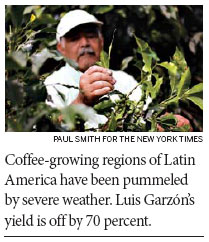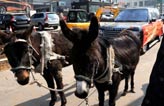Society
For coffee lovers, a serious setback
Updated: 2011-03-27 07:29
By Elisabeth Rosenthal (New York Times)
 |
TIMBIO, Colombia - In the last few years, coffee yields have plummeted here and in many of Latin America's other premier coffee regions. Rising temperatures and more intense and unpredictable rains are to blame, phenomena that many scientists link partly to global warming.
Yet as stockpiles of some of the best coffee beans shrink, global demand is soaring as the rising middle classes of emerging economies like Brazil, India and China develop the coffee habit. Coffee plants require the right mix of temperature, rainfall and spells of dryness for beans to ripen properly and maintain their taste. Coffee pests thrive in the warmer, wetter weather.
Most of the small landowners in Colombia's lush mountainous Cauca region have thrived for decades by supplying shade-grown, rainforest-friendly Arabica coffee for top brands like Nespresso and Green Mountain. The shortage of the Arabica beans is being felt in New York and Paris, as customers blink at escalating prices. Purveyors fear that Colombia's Arabica supply may not rebound.
In 2006, Colombia produced more than 12 million 60-kilogram bags of coffee, and set a goal of 17 million for 2014. Last year the yield was 9 million bags.
Major brands have increased the retail prices of many grinds by 25 percent or more.
Profits of coffee chains like Starbucks and Green Mountain have eroded. Coffee futures of Arabica have risen more than 85 percent since June, to $2.95 per half a kilogram, partly over concerns about supply, weather and future quality, said George Kopp, an analyst at the International Futures Group in Chicago.
"Coffee production is under threat from global warming, and the outlook for Arabica in particular is not good," said Peter Baker, a coffee specialist with CABI, a research group in Britain that focuses on agriculture and the environment, noting that climate changes have harmed crops across Central and South America.
He has rattled trade forums by warning of the possibility of "peak coffee," meaning that, like oil supplies, coffee supplies might be headed for an inexorable decline unless growers expand production globally.
Arabica and Robusta coffee account for virtually all consumption. With its more delicate taste and lower caffeine content, Arabica is more popular and more expensive, though more sensitive to weather. Robusta production dominates in Asia and Africa.
Colombia is the No. 2 Arabica exporter after Brazil, where production is centered on larger, more mechanized farms and continues to grow. The Colombian Coffee Growers Federation says high fertilizer prices have also dented yields. But it agrees with the International Coffee Organization that "climatic variability is the main factor responsible for changes in coffee yields all over the world."
Agronomists are teaching the farmers how to control the pests that arrived with the change in the weather. Geneticists are breeding plants that are more disease-resistant or that can withstand torrential rains or more heat.
The Coffee Growers Federation has advised farmers to switch to a new, hardier Arabica strain that was developed at Cenicafe.
Farmers have resisted because they can ill afford to forgo income as they wait for new plants to mature. They have also been wary that a switch could affect flavor.
Taste, quality and supply are delicate issues for an industry whose aficionados are notoriously picky.
The coffee federation is creating a "product origin" certification program, similar to the one that protects Italy's Parmesan cheese. That way importers will not be tempted to substitute coffee beans from Brazil or Indonesia.
At the Garzon farm in Colombia's Cauca region, yields are down 70 percent from five years ago. The coffee rust fungus has killed entire fields. Now, the family is planting the new, hardier Arabica variant. Said Luis Garzon, 80: "We learned our lesson."
The New York Times
E-paper

Rise and shine
The Chinese solar energy industry is heating up following recent setbacks in the nuclear sector
Preview of the coming issue
Bombs aim for regime change
CSI, with a twist
Specials

The queen of panda cubs
Spanish Queen Sofia laughs as she plays with a panda.

London's Olympic Stadium
Construction on the flagship stadium for the 2012 London Olympics was completed Tuesday.

Donkey-powered Land Rover
Two donkeys pull a broken-down Land Rover in Shenyang, Liaoning province.
